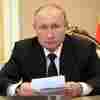Moscow begins new restrictions as Russia’s COVID-19 deaths hit a record high
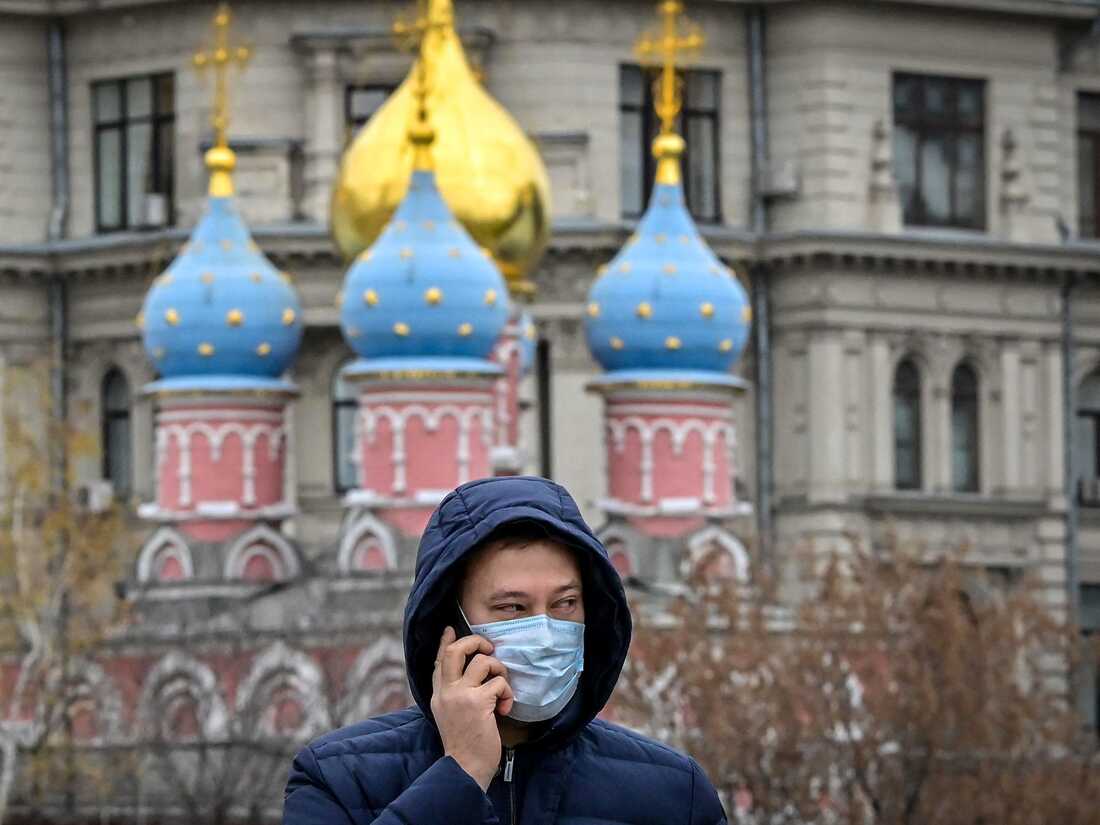
A man wearing a face mask speaks on his phone in central Moscow on Wednesday. Yuri Kadobnov/AFP via Getty Images hide caption
toggle caption
Yuri Kadobnov/AFP via Getty Images

A man wearing a face mask speaks on his phone in central Moscow on Wednesday.
Yuri Kadobnov/AFP via Getty Images
MOSCOW — Russia’s capital entered a 10-day partial lockdown on Thursday — as the rest of Russia braced for a series of COVID-19 restrictions aimed at stemming the spread of a virus that has set, and continuously reset, records over the past month for daily fatalities and infections.
On Thursday, the government’s coronavirus task force reported the latest grim milestone — a record-high 40,096 infections and 1,159 deaths in the past 24 hours alone.
The Kremlin openly blames the unprecedented surge on Russians’ continued reluctance to vaccinate. Despite widespread access to Russia’s Sputnik V for most of this year, just over a third of the country is fully vaccinated.
“These are intelligent people with a good education. I can’t understand what’s going on,” said a clearly exasperated President Vladimir Putin, commenting on the growing crisis last week. “We have a reliable and efficient vaccine. I want to emphasize again, there are only two choices: get sick or get vaccinated.”
Russian officials have registered more than 235,000 deaths since the start of the pandemic — the highest number in Europe — even as independent analysts have cited evidence that suggests the true number may be much higher.
Yet it’s a surge from the delta strain of the virus that has authorities suddenly reintroducing restrictions, after repeated assurances that the pandemic was well under control.
With health officials warning that existing COVID wards were near capacity, Putin announced last week a nationwide “non-working week” from Oct. 30 through Nov. 7. He has delegated authority to regional governors to implement additional restrictions to stop the virus’ spread.
The result has been a patchwork of measures rippling across the country.
In Stavropol, in Russia’s south, police erected checkpoints demanding that Russians seeking last-minute vacations provide proof of vaccination for entry.
In Khakassia, a republic in eastern Siberia, authorities have imposed a 10 p.m. curfew and put a halt to all public transport.
“There’s not much to do here at night anyway,” says Alexei Kirichenko, an independent journalist in Khakassia’s main city of Abakan. “But the same people who complain about the buses not working now are the same ones who never wore masks to begin with. Of course no one likes the restrictions.”
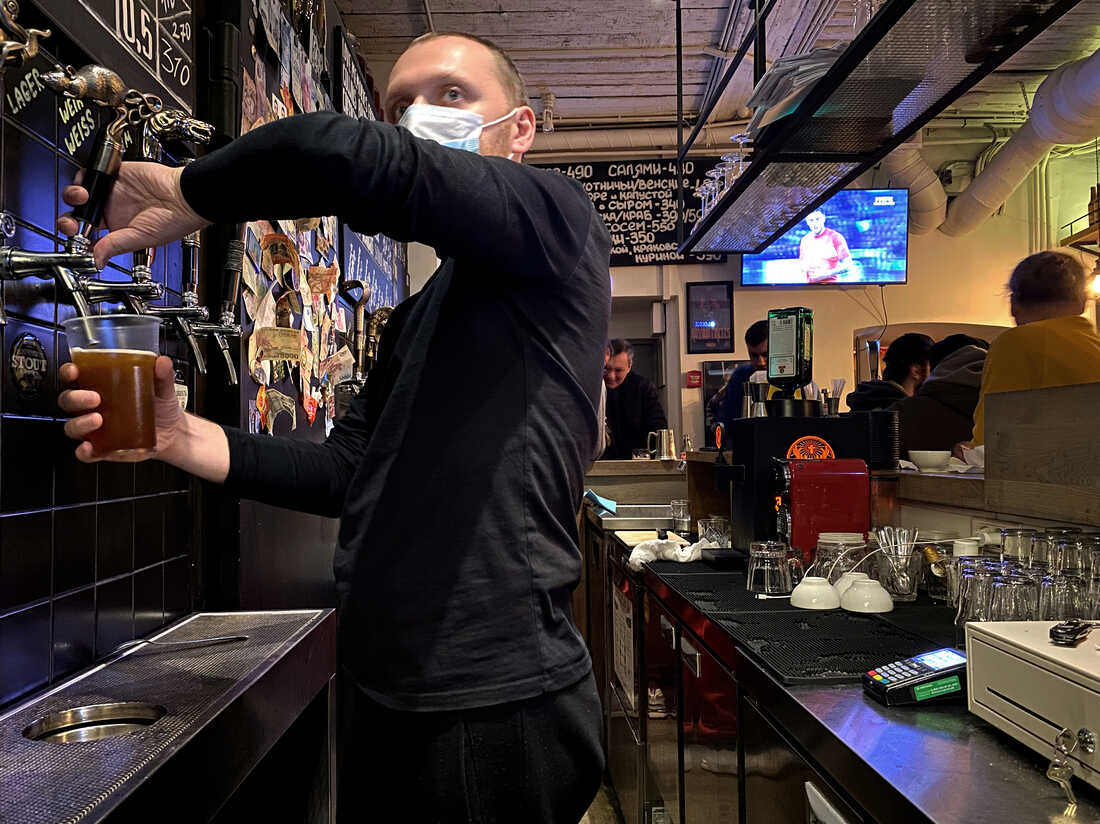
Last call at a Moscow bar on Wednesday night. The city has shut down most service industry businesses amid a record surge in coronavirus infections and deaths. Charles Maynes/NPR hide caption
toggle caption
Charles Maynes/NPR
Moscow has closed for business — mostly
In Moscow, a web of new lockdown measures brought an abrupt end to a sense of normalcy that had settled over the capital in the past few months.
Under the order of Mayor Sergei Sobyanin, unvaccinated seniors are required to stay at home over the next four months. Schools are shuttered. Offices have sent workers home. The metro stands largely empty.
Meanwhile, city restaurants, bars, cafes, salons, gyms, movie theaters, and — for reasons few could fathom — car repair shops are closed to customers as of midnight Wednesday.
Around the city, there is a sense that small businesses are taking the brunt of the government lockdown, just as they did in June 2020 — when the Kremlin ordered businesses shuttered, providing little in the way of bailout funds offered to larger state companies. Many smaller shops closed for good.
“If they keep us shut for months like the last lockdown, we’re done for,” says Anna Alekseeva, 25, who works at one of a slew of small craft beer bars that have popped up in Moscow in recent years. “This isn’t Europe or America. The government here doesn’t care about small business at all.”
But theaters and museums are still open
Moscow theaters and museums remain among the few public spaces still open to visitors — albeit at 50% capacity and with proof of vaccination.
That includes “Life with Viruses,” a new exhibition at the Exhibition of Achievements of National Economy park, known as VDNKh, in Moscow. The exhibition is dedicated to the history of the interplay between humans, viruses and medicine.
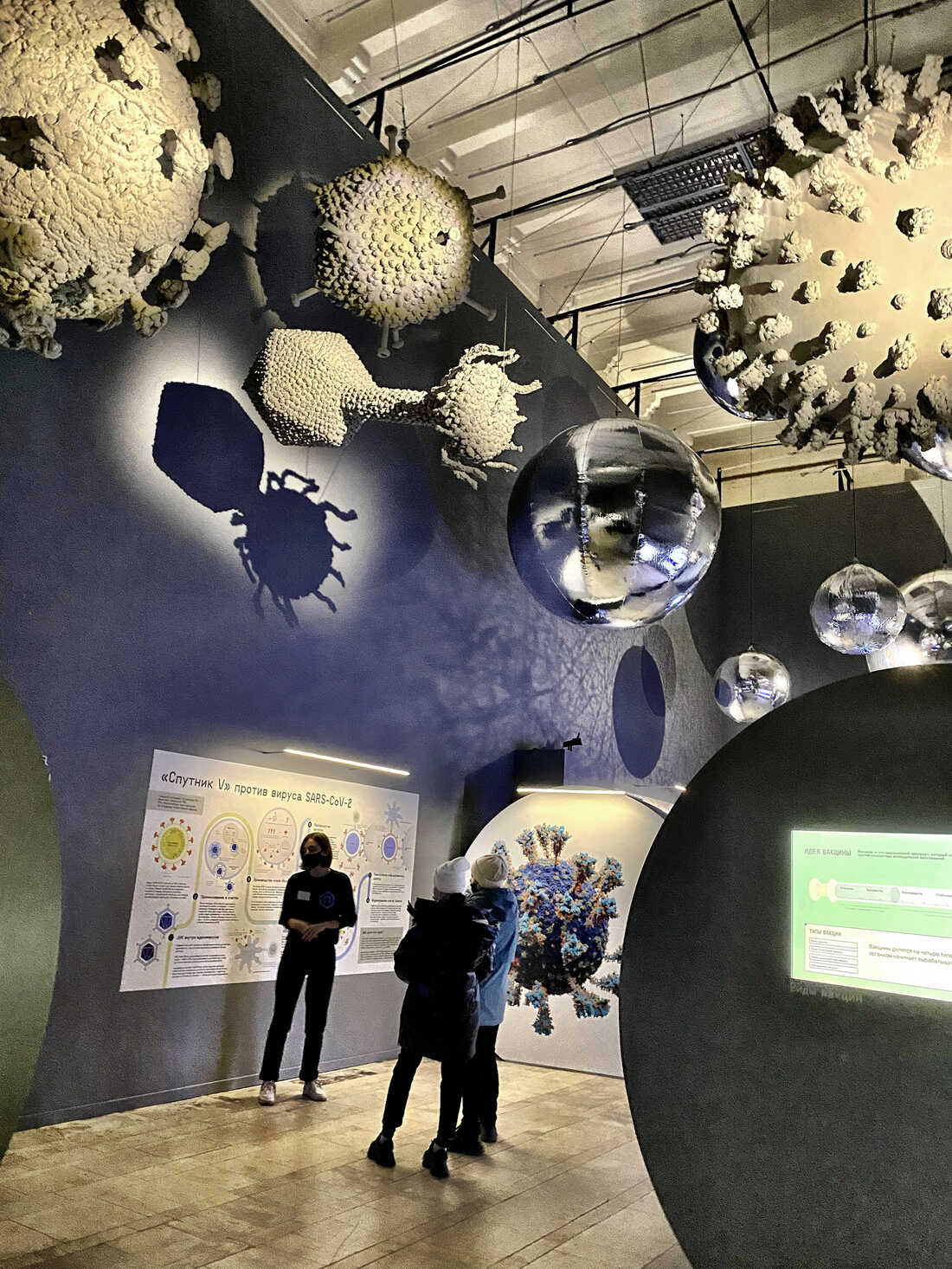
Visitors take in a tour of the “Life with Viruses” exhibit in Moscow. As of Thursday, the museum is one of few public spaces available to vaccinated Russians. Charles Maynes/NPR hide caption
toggle caption
Charles Maynes/NPR
A mannequin of a doctor wearing a beak as part of his costume from the Middle Ages’ Black Death era greets visitors. Huge models of spores, bacteria and bacilli hover from the ceiling. An interactive video game called “Pandemic” allows players to try and save a metropolis from mass infection. In the corner, a hologram of the coronavirus — with its now-famous spikes — pulsates against the wall.
“I look at it and meditate,” says curator Sergei Rikov, of the Moscow Polytechnical Institute, while providing a recent tour. “We don’t want to scare anyone. Our goal is to inform. The more we understand what we’re dealing with, the better chance have of coming up with ways to defend ourselves.”
Rikov notes the exhibit has proved popular with once-skeptical government health officials looking to reboot Russia’s vaccination efforts.
The museum plans to take a “light version” on the road to cities across the country beginning this winter.
“It’s a more effective way to educate people — have them learn and share what they know — than some big television propaganda campaign across the country,” he says.
Propaganda and distrust feed the problem
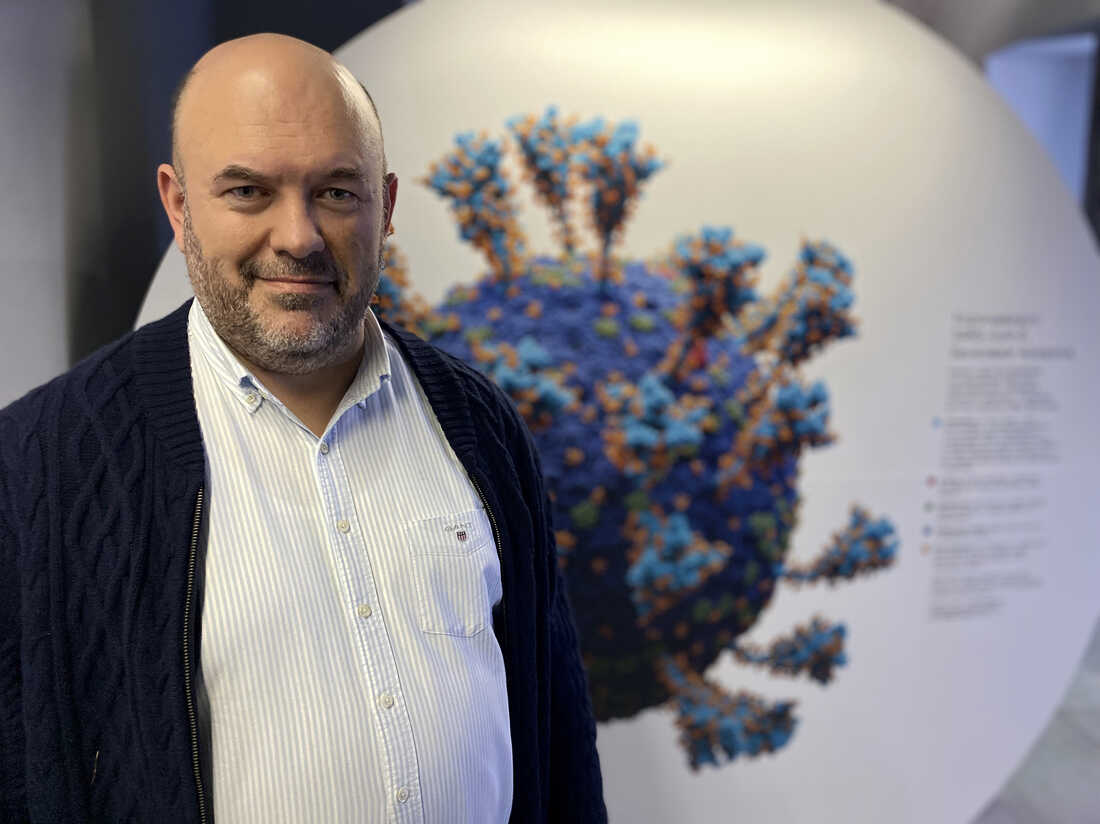
Sergei Rikov, curator of the exhibit “Life with Viruses” in Moscow, poses before a model of the coronavirus. Rikov argues the exhibit can play a role in educating Russians about the coronavirus — and the need to vaccinate. Charles Maynes/NPR hide caption
toggle caption
Charles Maynes/NPR
Rikov and others hoping to educate Russians on the pandemic will likely face an uphill battle. Health experts say that Russia’s current COVID woes are due at least in part to the Kremlin’s own propaganda machine. Conspiracy-minded state media has fed Russians a steady diet of distrust of vaccines, science and truth itself.
“At the beginning of the pandemic, the media was saying that the virus wasn’t that terrifying or that Western vaccines were dangerous,” says Georgii Bazykin, a biologist at the Skolkovo Institute in Moscow who has studied the epidemiology of the coronavirus in Russia.
“Well, people aren’t dumb. If they hear that Pfizer or Moderna are bad, then it makes sense that our Sputnik [vaccine] is bad too. It played a cruel joke on our vaccination efforts,” he says.
“There’s so much information these days that we don’t know what to think anymore. Is it a conspiracy or not?” says Elena, a social worker in Moscow who declined to give her last name name, saying she was not authorized to speak to the press. “I just want life to go back to normal.”
But not everyone sees the government’s vaccination efforts so far as a failure.
“A third of Russians vaccinating isn’t a bad result at all,” says Mikhail Parfeonov, a father of two visiting Moscow from Kirov in central Russia. “What can I say? People don’t believe the government. It’s Russia. Get used to it.”
*** This article has been archived for your research. The original version from NPR can be found here ***
